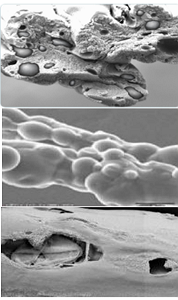Direct incorporation of meltable or volatile lipophilic additives (PCM, carboxylic acids, …) by means of encapsulated additives and fibers or fabric after-treatment, only!
Main disadvantages:
- High demands on uniformity of capsules sizes,
- Limitation of incorporated amount of capsules and
- High damage of capsules during mechanical stress at textile fibers processing
Fibers are Natural
- Main raw material is wood pulp from non-endangered trees.
- Additive paraffin is refined plant oil, e. g. extracted oil from rape flowers

